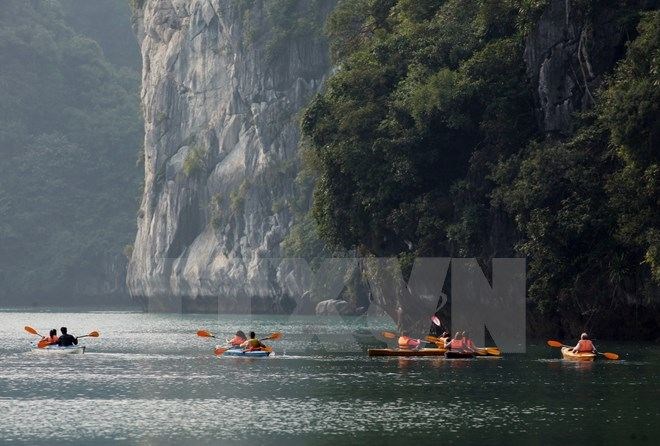
Located in the east of Cat Ba Island, the northern city of Hai Phong, Lan Ha Bay has become a tourist magnet thanks to its unique beauty.
Located in the east of Cat Ba Island, the northern city of Hai Phong, Lan Ha Bay has become a tourist magnet thanks to its unique beauty.
Although not many people know about it, Lan Ha is one Vietnam’s most beautiful bays. Autumn is the best time to visit Lan Ha Bay because the weather at this time is extremely beautiful with pleasant sunshine, cool breezes, and blue sky and ocean.
 |
| Lan Ha Bay (Photo: VNA) |
Linking Ha Long Bay of Quang Ninh province with Cat Ba archipelago, Lan Ha Bay is like a silk ribbon made from green mountains, blue sea and diverse fauna and flora. It is a tranquil, curved body of water featuring about 400 islands.
Unlike Ha Long Bay, all 400 islets in Lan Ha are covered with vegetation with unique values, especially landscape values.
Lan Ha Bay spreads more than 7,000 hectares, including 5,400 hectares under the management of Cat Ba National Park.
Aside from beautiful beaches, its attractiveness also lies in limestone mountain ranges that divide the sea into smaller bays, lagoons and caves, many of which are unexplored.
There are hundreds of limestone mountains in the shape of things such as clogs or bats which also give the islets their names.
Stalactite caves and caverns can also be seen in Lan Ha. Some outstanding ones are Ham Rong Cave, Do Cung Cave and Ca Cave.
Lan Ha Bay boasts 139 small and quiet sandbanks, many of which are located between two rocky mountains – a feature bringing peace and ripples, making these sandbanks ideal bathing beaches.
Under the clean and blue water are colourful coral reefs such as Van Boi and Van Ha reefs, good for diving.
Calm sea areas like those off Sen Island, Cu Island and Khi Island are also places vacationers can swim and dive to see coral. Some rocky islets with favourable natural conditions have also been used to develop leisure tourism activities.
To fully enjoy the beauties of limestone islets as well as the landscapes of Lan Ha Bay, tourists should travel by kayak. By the means of transport, they can explore new experiences that cannot be felt on cruise ships. Snaking through islets and small caves, kayaks can access the foot of rocky mountains, giving tourists a view of the world under the blue water.
Visitors will be astonished at the nature in Lan Ha Bay and feel at peace while being here.
Cat Dua Island, also known as Khi (Money) Island, is a must-visit destination in Lan Ha Bay. Many leisure tourism activities have been offered on this island, luring many foreign holidaymakers in recent years. The waters around Cat Dua harbour pearl farms are also interesting places to see.
A typical tourism product in Lan Ha Bay is small fishing villages and those that farm local specialties such as Asian green mussel, clam, cobia, crab, abalone and grouper. Many of such aquaculture farms supply fresh seafood for tourists when they set foot in the bay.
Two places of interest many travel companies introduce to visitors are Van Gia fishing village, which is more than 100 years old, and Viet Hai fishing village, which is almost entirely isolated from modern life.
Bay ecotourism recently is focused on investment. Only taking 5 minutes to travel from Beo wharf toward the north to reach Cat Dua Island with many tourism services are being exploited. This tourism form is attracting a lot of foreign tourists to arrive for resting.
Thanks to those advantages, tourism activities are flourishing in Lan Ha Bay, satisfying domestic and foreign visitors’ growing demand to discover the bay in the north of Vietnam.
(Source:VNA)





